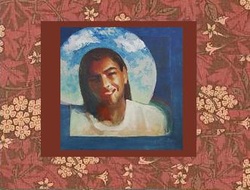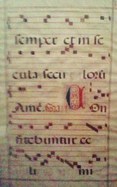
Click here to enter the new FAQs page on Singing from Silence. If you don't find an answer to your question, you can send me a line.
I'll look forward to hearing from you! Best blessings! -Pam Richards
| A Candle to the Sun |
|
 Ever wonder about the difference between memoir and biography? What to expect to find in Singing from Silence? If you have questions about Rich Mullins' life, do you know how to find the answers? Click here to enter the new FAQs page on Singing from Silence. If you don't find an answer to your question, you can send me a line. I'll look forward to hearing from you! Best blessings! -Pam Richards
0 Comments
 If you've ever had the mixed blessing of being closely involved with a celebrity, you know the circle keeps expanding, and you've seen how ugly things can get when followers lose confidence that their friendship is appreciated. Being around the best people can bring out the worst in human beings. Transparent bids to make others look bad and covert power plays are sadly inevitable, it seems. Jesus was looking over the shoulders of his disciples as they argued. He watched as a child, looped around with ropes of lilies, played in a puddle fed by the spring rains. His followers began to exchange verbal blows, each seeking any foothold, any leverage to make himself look better than the rest. Finally the tensions bubbling between the disciples surfaced as a question: "Teacher, who is the greatest in the Kingdom of Heaven?" Jesus broke away from the circle of disciples, dropped to his knees, and stretched his arms out to the child. The little boy ran to Jesus, who swooped him up and spun him around, kicking in the air and shrieking with laughter. The little one slipped his handmade crown of lilies on Jesus' brow, where they dangled lopsided over Jesus' left eye, gloriously spilling diamonds of raindrops down Jesus' beard to sparkle in the golden dust covering his robes. The child took in the vision in silent delight and Jesus took him by the hand. Jesus stood the child before his disciples and stooped down to child's-eye level. “Truly I tell you, unless you change and become like little children, you will never enter the kingdom of heaven. Therefore, whoever takes the lowly position of this child is the greatest in the kingdom of heaven. And whoever welcomes one such child in my name welcomes me.” In their lowly state, what do children have that gives them privileged access to the kingdom of heaven? They lack cynicism, unbelief, and callousness. Little children do not find in others what they themselves lack. I learned from my friendship with Richard that those who see only guilt misunderstand the best intentions of faith; those who see only fear misunderstand the best intentions of hope; those who see only greed misunderstand the best intentions of charity; but those who find the best intentions in others see only God. Steps taken in faith lead to results in God's time. . . framing of the new barn begins tomorrow! Step by step, the feet of faith carry us forward! Bring your hands and feet to Revelation Ranch. Your help will be gratefully accepted.
Much obliged, Your friends at Revelation Ranch. This video was made with the gorgeous photography of Larry Henry taken in the foothills of Appalachia, to the outstanding musical accompaniment of Kyle Meadows on hammered dulcimer.
Merry Christmas, guys!  November was dedicated to making progress on Walk Through the Valley. I haven't made it through that valley yet, but I'm taking it one step at a time. . . This month, I'm catching up on a few things I'd promised to do and haven't gotten to yet! I've just added a new page to the website which is s short bio of Rich Mullins. If you have any suggestions for items to include, send me a line here! I'll be glad to hear from you. Christmas greetings from my friend Ted Yoder! Love this carol, Ted! www.tedyoder.com
 It's nothing new; it's at least as old as David playing his lyre for poor mad Saul in ancient Israel. It's not surprising then, to find that the ancient Greeks also used music as medicine. Romans were the mighty military force in the time of Christ, but because of their admiration of all things Greek, the Romans took Greek culture right along with them on those miles and miles of roads they built. Greek musical medicine was centered on the four elements: air, water, fire and earth. Chronic health problems were said to originate in an imbalance of these elements. Too little or two much of any element (or humour, but I'll stick with element--less confusing!) was said to create a state of dis-ease. With four elements and two ways to be imbalanced, there were eight states of disease recognized in this system of medicine. Greek music consciously used eight modes, or prescribed combinations or intervals of notes included in a tune, to address disease. The purpose of music in these medical modes was either to increase or decrease the element which was out of balance. Whatever we think of this medical practice, the early Church thought highly enough of it to adopt the therapeutic modes for use in their music, renaming them Church Mode I, II, III, and so on.* The Gregorian chants were all built on these modes, and the mass and the liturgy rotated through the modes and were designed in a sense to offer healing to hearers. *If you like to use multi-syllabic words that are largely obscure except to certain musicians, the Greek names of the modes are Dorian, Lydian, Phrygian, and Mixolydian--each intended to increase one of the elements. Their companion modes are meant to decrease one of each of the elements: Hypodorian, Hypolydian, Hypophrygian, and Hypomixolydian.  Introduction to Walk Through the Valley This book is a brief discussion of the ethics of the Beatitudes as Rich Mullins introduced them to me. I wouldn’t blame you if you laughed to think of the Beatitudes as ethics in the rational sense of law and order. The order of the Beatitudes is the order of diminishment, of foolishness, of extremes, of passionate wild abandon to righteousness. No human government would dare enact laws like these. Yet they are able to produce profound shifts of internal attitude by allowing us each to see our human predicament through God’s eyes. The Beatitudes Richard Mullins showed me went beyond a system of ethics; they were both a remedy to heal the broken soul and a blueprint to establish the Kingdom of Heaven on earth. Richard and I became friends on our first day as freshmen at the Cincinnati Bible College in 1974. It is my intention here to write about Richard, not for him. I’ll never claim to be a perfect Christian, but it was because of my friendship with Richard that I fell in love with Jesus Christ. I would be surprised if readers found anything astonishingly new in this work. Richard loved to hear and tell the old story. My hope is simply to show readers Jesus as I saw him reflected in Richard’s eyes. Richard had a restless energy, but an even larger and more expansive spirit. During many conversations through the years, I learned that Richard found the dichotomy between mind and spirit a fascinating puzzle--and sometimes a frustrating one. In the mid-seventies, his insistence on coming to terms with the body versus spirit dilemma set off a frenzied burst of reading outside his classroom assignments during the hours he worked at the payout booth of the parking garage, and well on into the night. Some claimed his insomnia was due to his habit of sleeping only on the carpeted concrete floor of his dorm room, and never in the comfort of his bed. The topic never came up and I never asked, so I still don't know whether this eccentric sleeping arrangement was an attempt to emulate his hero, St. Francis of Assisi. But I had an opinion about his reading habits. I believed his constant reading was likely due to his highly active mind; and his effort to love God with all his mind, soul, heart and strength. |
Pam RichardsGod help me, I'm an artist. Archives
May 2021
Categories
All
Blogroll
|